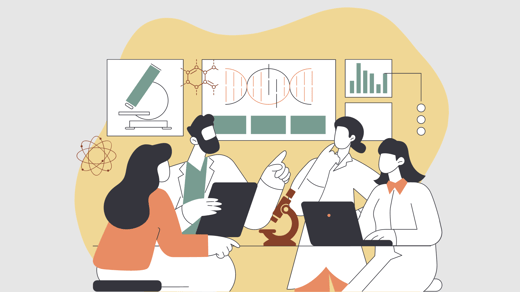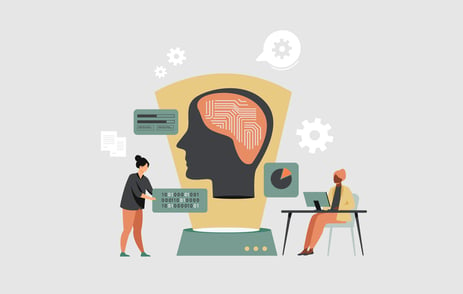In today's rapidly evolving professional landscape, the advent of artificial intelligence (AI) stands as both a beacon of potential and a challenge to traditional notions of career development. As AI reshapes industries and job functions, it demands a paradigm shift in how we approach professional growth. We can no longer rely solely on established skill sets or predictable career trajectories; instead, the future belongs to those who embrace flexibility and a growth mindset. This shift isn't just about keeping pace with technological advancements—it's about redefining what it means to be a resilient, adaptable professional in an AI-driven world. In this article, we’ll take a look at the role of flexibility in professional development, to uncover how embracing change and continuously acquiring new skills is imperative in the age of AI.
The Evolving Landscape of Professional Development
The impact of AI on the job market is both undeniable and multifaceted. AI isn’t just a tool that automates tasks; it's a transformative force that’s redefining job roles and industry standards at an unprecedented pace. AI is leading to the creation of new job categories while simultaneously rendering some traditional roles obsolete. This rapid evolution demands a significant shift in our approach to professional development.
Say goodbye to the days when mastering a single skill set or earning a specific degree guaranteed a lifelong career. Today, professionals are expected to continuously adapt, learning new skills and technologies as they emerge. This dynamic environment values versatility and the ability to pivot in response to new challenges and opportunities. As AI technologies become more integrated into every aspect of work, the ability to learn and adapt has become more crucial than ever. This change goes beyond technical skills; this is about developing a mindset that embraces continuous learning and evolution, ensuring that professionals remain relevant and competitive in a landscape that is constantly being reshaped by AI.
Flexibility: A Necessary Skill in the Age of AI
In today’s digital landscape, flexibility transcends the traditional understanding of being open to change. It now embodies the capacity to rapidly acquire new skills, adapt to evolving technologies, and pivot in response to an ever-changing job market. Flexibility in this context is about being agile, not just in thought and approach, but in action and learning as well.
This agility is crucial for several reasons. First, as AI automates routine tasks, the human workforce is pushed toward roles that require more complex, creative, and strategic thinking—areas where AI can’t easily replicate human capabilities. This shift necessitates a workforce that can quickly adapt to new roles and responsibilities, often ones that didn’t exist just a few years ago.
Second, the integration of AI into the workplace isn’t uniform across industries or even within organizations. This means professionals must be prepared to work in hybrid environments where AI tools and human skills complement each other. The ability to understand and interact with AI technologies becomes as important as the ability to work alongside human colleagues.
Lastly, flexibility is about resilience. In an AI-driven work environment, setbacks and rapid changes are common. Professionals who can navigate these challenges, learn from them, and adapt their strategies accordingly are more likely to succeed and thrive.
Therefore, cultivating flexibility isn't just important for staying relevant; it’s vital for being proactive in a world where the only constant is change. Not to mention, building a career that's not just resilient to the shocks of technological disruption but is also capable of leveraging these changes to create new opportunities.
The Growth Mindset: A Foundation for Continuous Learning
The concept of a growth mindset, popularized by psychologist Carol Dweck, is particularly relevant in the age of AI. It's the belief that abilities and intelligence can be developed through dedication and hard work. This mindset is crucial for professionals facing the challenges and opportunities presented by AI. It fosters a love for learning and resilience, which are essential for success in a rapidly evolving work environment.
A growth mindset encourages individuals to view challenges as opportunities to grow rather than insurmountable obstacles. In an AI-driven workplace, this means embracing the learning curve that comes with new technologies, rather than being intimidated by it. For example, a marketer might need to learn about AI-driven analytics tools, seeing this not as a hurdle but as an opportunity to enhance their strategic decision-making skills.
A growth mindset also helps professionals deal with the setbacks and failures that are inevitable when experimenting with new technologies and approaches. Instead of viewing these failures as a reflection of their abilities, they see them as a natural part of the learning process. This perspective is vital in an environment where AI can rapidly change the rules of the game, requiring a continuous adaptation of skills and approaches.
In essence, a growth mindset is about viewing professional development as a continuous journey rather than a destination. It's about remaining curious and enthusiastic in the face of change. These qualities are indispensable in harnessing the full potential of AI in one's career.
Emerging Skills for an AI-Driven Future
As artificial intelligence becomes increasingly integrated into the workplace, certain skills are emerging as particularly valuable. These skills not only facilitate direct interaction with AI technologies but also enable professionals to complement and leverage these technologies effectively.
- Data Literacy: Understanding and interpreting data is paramount in an AI-driven workplace. Professionals in various roles are now expected to make data-driven decisions, which requires a basic understanding of how to read, analyze, and draw insights from data.
- AI Ethics and Policy Understanding: As AI systems become more prevalent, understanding the ethical implications and relevant policies is crucial. This skill involves not just compliance with regulations but also an understanding of how AI decisions impact society and individuals.
- Cross-disciplinary Collaboration: The future of work is increasingly collaborative and cross-disciplinary, especially in fields where AI plays a significant role. Professionals must be able to work effectively with colleagues from different backgrounds, including those in technical roles.
- Critical Thinking and Problem-solving: In an environment where AI can handle routine tasks, the value of human workers increasingly lies in their ability to think critically and solve complex problems. This skill is about applying human insight and creativity where AI cannot.
Strategies for Developing Flexibility and Relevant Skills
Developing flexibility and the necessary skills to thrive in an AI-driven environment requires a strategic approach. Here are some practical strategies for individuals and organizations:
- Continuous Learning: Embrace lifelong learning. This could mean taking online courses, attending workshops, or even learning through online platforms that offer AI-related content like Sidecar’s AI Learning Hub. The goal is to stay updated with the latest trends and technologies in your field.
- Mentorship and Networking: Seek mentorship from those who are already skilled in AI-related areas. Networking with professionals in your field can also provide insights into how others are adapting and applying AI in their work. Sidecar offers a community to converse with association professionals about various topics including AI that you might want to check out.
- Diverse Experiences: Gain experience in a variety of roles and projects. This diversity can provide a broader perspective and help develop the adaptability needed to work with AI technologies.
- Cross-functional Collaboration: Engage in projects that require cross-departmental collaboration. This exposure to different perspectives and skills can be invaluable in understanding how AI can be applied across various aspects of a business.
- Feedback and Reflection: Regularly seek feedback on your progress and take time to reflect on your learning experiences. This can help identify areas for improvement and reinforce new skills.
For employers and HR professionals, supporting these strategies is crucial. This can include providing access to learning resources, creating opportunities for cross-functional projects, and fostering a workplace culture that values continuous learning and adaptation.
By following these strategies, professionals can develop the flexibility and skills needed to not only adapt to the changes brought about by AI but also to lead and innovate in their fields.
Navigate the AI Landscape with our AI Learning Hub
The advent of AI in the professional world isn’t just indicative of a technological shift; it's a call to redefine our approach to career development and skill acquisition. Embracing flexibility and a growth mindset is essential in navigating this new landscape. By being adaptable, continuously learning, and developing skills that complement AI, professionals can not only stay relevant but also excel in their careers.
The future of work in an AI-driven era is not about competing with machines but about leveraging them to enhance our unique human capabilities. As we continue to integrate AI into various aspects of professional life, the ability to adapt and grow will distinguish professionals who thrive from those who survive. The key is to view AI not as a threat but as a catalyst for personal and professional development, a tool that opens new avenues for innovation and creativity.
As AI continues to evolve, it’s important for our approach to professional development to evolve with it. By fostering flexibility, nurturing a growth mindset, and embracing the continuous journey of learning, we equip ourselves and our employees for a future where AI and human ingenuity work hand in hand to create a more dynamic, efficient, and innovative workplace.
If you’re on the hunt for an impactful AI learning experience to gift your team, check out the AI Learning Hub for Association Teams. There, you’ll find content that resonates and enables professional growth regardless of the department.
%20(2).png?width=315&height=86&name=Untitled%20(600%20x%20400%20px)%20(2).png)

January 23, 2024


